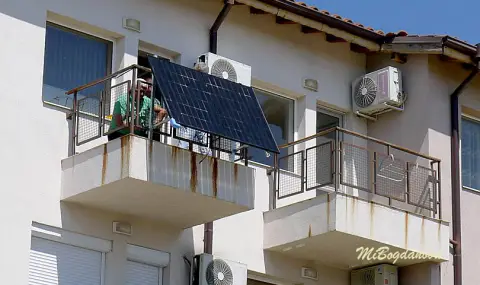The first photovoltaic microsystem on a balcony is already a fact in Bulgaria. It was installed in a municipal housing, where the socially poor live, in the city of Dupnitsa. It is implemented under the Sunrise project – Households producing household energy from the sun with the support of Habitat Bulgaria and the municipality of Dupnitsa. The goal is for households living in social poverty, and subsequently all others, to reduce their electricity bills. Another advantage is environmental protection.
The practice of placing solar panels on residential balconies is now firmly established in Germany. For this reason, the first installation was installed precisely by German experts from the German Solar Energy Society (DGS). In Germany in the current year, the number of installed photovoltaic micro systems will reach 1 million units.
What is the system
It consists of a solar panel, intertor, connector and plug. The size of one panel is 170x110 cm. It weighs between 22 and 25 kg. Each panel has a power of nearly 450 watts. They can be installed on a balcony, on the roof of a garage, on the roof of a house, as well as vertically on the facade of residential blocks. They are usually placed in two panels.
„The main advantage of the panels in question is that a person can install them himself. The help of a specialist is not needed, said Christoph Johan, photovoltaic project engineer from the German Solar Energy Society (DGS) during a presentation of the system in the municipality of Dupnica.

In Germany the system is called Plug-in PV. This is a small photovoltaic installation that is placed on the terrace. It consists of several solar panels (usually two) that transform sunlight into direct current energy. The energy inverter turns direct current into alternating current, from where it enters the energy network of the home itself and the household begins to consume electricity from the photovoltaic system.
In Germany, the law allows one electricity meter (one dwelling) to install one system with a power that does not exceed 800 watts. The goal for the cap is to produce roughly as much electricity as a household consumes.
Of course, the system also allows the attachment of a battery to save the energy accumulated by the sun and be consumed, for example at night.

„Initially in Germany we called these photovoltaic systems „guerrilla”. The reason is that there was no established legal framework and corresponding forms for registering this type of installations. Initially, the systems were used to stimulate the responsible institutions to adapt the legislation so that people could use cheap energy,“ explains Johan.
The advantage of the photovoltaic micro system for the environment
Using the system is the first step on the way to a climate neutral household and the transition from carbon fuels to renewable clean energies. The system contributes to the transition from fossil fuels to clean energy sources.
„The important point is that you, as an inhabitant of the particular building, may not have your own roof and may not have enough space to make such a system, but if you have something like a balcony, a terrace, you can produce clean energy,” adds Johan.
Last but not least, the system helps to reduce and overcome energy poverty by saving household costs.
„This type of system cannot replace large photovoltaic and wind installations. They are only for use in the respective household”, says Johan.

In our country, the first photovoltaic system on a balcony was installed in a municipal housing in Dupnitsa. The reason for this is primarily the lack of a legal framework and the still unregulated legal path. At the moment, it is easy to install such systems on private houses, but this is not the case for multi-family residential buildings. There, it is necessary for the homeowner, who decides to put such a system on his balcony, to have the consent of 51% of the owners of the building. Permission from the energy company serving the building is also required.
Habitat Bulgaria has already several times raised the issue of easing the legal environment regarding the placement of solar panels on balconies, but there has never been a reaction from the state.
You can see detailed statistics on average property prices in Bulgaria by cities and neighborhoods HERE

Solar panels are easy to carry
